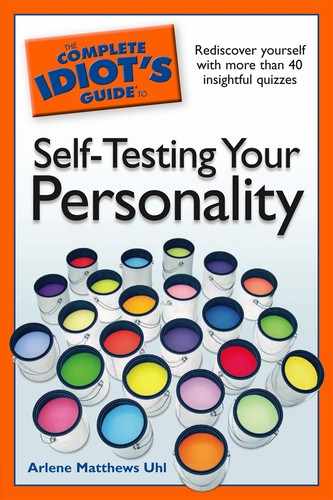Quiz 42
Am I a Narcissist?
A narcissist is someone with an extremely high level of self-absorption and a level of entitlement that leads him to focus exclusively on his own needs. The term comes from the Greek myth of Narcissus, a handsome young man so smitten with himself that he fell in love with his own reflection in a pool of water.
We all pass through this developmental phase. In early childhood, we are wholly wrapped up in our own points of view. But as we develop and mature, that self-obsessed perspective is, ideally, replaced by a growing awareness that other people have differing thoughts, beliefs, and feelings that must be taken into account.
Narcissism falls on a continuum. While a healthy threshold of self-regard is desirable, one can be a bit—or a bunch—more self-preoccupied than is desirable to maintain strong and meaningful relationships. Narcissists tend to be insensitive to others and are notoriously bad at respecting social boundaries.
Are you a narcissist?
Take the Test
For each of the following statements, indicate the number of the statement that corresponds to your level of agreement or disagreement:
1. Strongly disagree
2. Somewhat disagree
3. Feel neutral or are not sure
4. Somewhat agree
5. Strongly agree
1. I feel that exceptions to the rules should be made for me.
2. I have expectations of myself that many see as unrealistic.
3. I fake emotions I think I ought to have but do not actually have.
4. I am immune to flattery.
5. I feel outraged if someone slights or ignores me.
6. I deserve leniency if I do something wrong.
7. I will take on a great deal of debt to make a good impression.
8. Deep down, I know I am an underappreciated genius.
9. I am vain when it comes to my physical appearance.
10. I should be much richer than I am.
11. People have referred to me as “spoiled.”
12. I love being the center of attention.
13. I am smarter than most people.
14. People have referred to me as “humble” or “modest.”
15. I hate to waste time cleaning up after myself.
16. I believe the universe has something very special in store for me.
17. My time is more valuable than most people’s.
18. I have no patience for other people’s problems.
19. In conversations, I listen more than I talk.
20. I have no compunctions about attending social events where I am not invited.
21. I have snooped, eavesdropped, or opened other people’s mail.
22. I feel like I have psychic abilities.
23. At work, I try to get out of doing menial tasks.
24. In romantic relationships, I fall in love quickly but then cool off quickly.
25. I have ended several romantic relationships abruptly without looking back.
Scoring and Explanation
To obtain your score, tally your points. But before doing so, be sure to reverse the score (5 = 1, 4 = 2, 3 = 3, 2 = 4, 1 = 5) for the following items: 4, 14, 19. Remember, in reversing the score, high numbers are traded for low and vice versa. Unless you reverse the scores for the items listed—and only for the items listed—your result will be inaccurate. See the Introduction to this book for a full explanation of reverse scoring.
• A score of 90-125 indicates that you have narcissistic tendencies. The higher your score, the more these tendencies will tend to undermine you both in relationships and in your ability to achieve the success you so desire.
An excessive preoccupation with yourself can, ironically, be a serious self-defeating behavior. Underneath your veneer of assurance you are extremely vulnerable to criticism and failure, lacking the resources necessary for resilience. And because your actions and attitudes have not led to the creation of a strong social network, you can come up short in the important realm of social support.
Narcissism in its extreme is classified as a type of “personality disorder.” But only an individual consultation with a professional can help you discover if you meet such clinical criteria. Also, it’s possible to embody some narcissistic traits without meriting a diagnostic label. If you believe you have narcissistic tendencies, make a conscious attempt to consider the needs and points of view of other people. But also be honest with yourself about what your grandiose attitudes could be masking. Many professionals who have studied narcissism in great depth contend that narcissists are overcompensating for what actually is self-doubt. Owning up to your own insecurities—we all have them—can be a first step in building a healthier ego and more satisfying and nurturing bonds with others.
..................Content has been hidden....................
You can't read the all page of ebook, please click here login for view all page.
